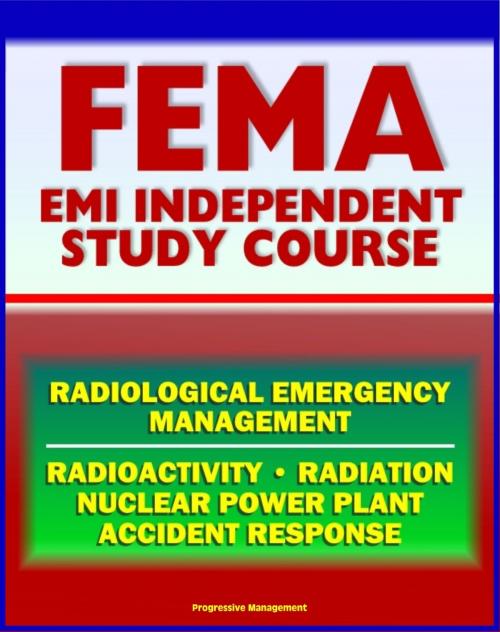21st Century FEMA Radiological Emergency Management Independent Study Course (IS-3), Radiation, Radioactivity, Nuclear Power Plant Accidents, Detonation, Biological Effects, Protective Actions
Nonfiction, Science & Nature, Science, Physics, General Physics, Social & Cultural Studies, Political Science| Author: | Progressive Management | ISBN: | 9781458078261 |
| Publisher: | Progressive Management | Publication: | March 14, 2011 |
| Imprint: | Smashwords Edition | Language: | English |
| Author: | Progressive Management |
| ISBN: | 9781458078261 |
| Publisher: | Progressive Management |
| Publication: | March 14, 2011 |
| Imprint: | Smashwords Edition |
| Language: | English |
This vital Federal Emergency Management Agency (FEMA) independent training course manual from the Emergency Management Institute (EMI) provides authoritative, official information about radiological emergency management. Contents include: Fundamental Concepts * Radioactivity * Biological Effects of Radiation * Exposure Control Techniques * Emergency Management and the Radiological Protection System * Radiological Transportation Accidents * Packaging * Information Sources * On-scene Accident Response * Nuclear Power Plant Accidents * Operating Principles of Nuclear Power Plants * Power Plant Accidents * Offsite Protective Actions * Nuclear Threat * Nuclear Detonation * Protective Measures * Exposure Rate Determination * Other Radiological Hazards * Other Radiation Sources * Natural Sources * Man-made Sources * Glossary. This is one of the series of influential FEMA documents providing crucial material on disasters and emergency response.
In a radiological emergency, effects caused by radiation may be a significant concern. Throughout this course, the term radiation refers to ionizing or nuclear radiation. Radiological emergency management is a term that describes efforts to prevent, prepare for, respond to and recover from an event that could result in significant radiation-related effects. Efforts to prevent radiological emergencies include actions to stop such events from happening and actions that decrease the harmful effects of such an occurrence. Efforts to prepare for a radiological emergency include learning the warning signs and knowing what to do during an emergency. Responding to a radiological emergency means taking appropriate actions to protect yourself and others from harm. Recovering from a radiological emergency includes actions performed after an emergency to return to normal. Ionizing radiation cannot normally be seen by the human eye, nor can it be smelled, heard, or otherwise detected by our normal senses. Radiation can only be detected by radiation detection instruments. This characteristic makes radiological emergencies different from other types of emergencies such as floods, hurricanes or explosions. To prepare effectively for radiological emergencies, it is necessary to understand what radiation is, what types of events can cause a radiological emergency, and what harmful effects could result from such an event. This course is designed to familiarize you with: Types of radiological emergencies. Potential effects of radiological emergencies on the public. Fundamental concepts related to how you can best ensure the safety of yourself and others during a radiological emergency.
This is a privately authored news service and educational publication of Progressive Management. Our publications synthesize official government information with original material - they are not produced by the federal government. They are designed to provide a convenient user-friendly reference work to uniformly present authoritative knowledge that can be rapidly read, reviewed or searched. Vast archives of important data that might otherwise remain inaccessible are available for instant review no matter where you are. This e-book format makes a great reference work and educational tool. There is no other reference book that is as convenient, comprehensive, thoroughly researched, and portable - everything you need to know, from renowned experts you trust. For over a quarter of a century, our news, educational, technical, scientific, and medical publications have made unique and valuable references accessible to all people. Our e-books put knowledge at your fingertips, and an expert in your pocket!
This vital Federal Emergency Management Agency (FEMA) independent training course manual from the Emergency Management Institute (EMI) provides authoritative, official information about radiological emergency management. Contents include: Fundamental Concepts * Radioactivity * Biological Effects of Radiation * Exposure Control Techniques * Emergency Management and the Radiological Protection System * Radiological Transportation Accidents * Packaging * Information Sources * On-scene Accident Response * Nuclear Power Plant Accidents * Operating Principles of Nuclear Power Plants * Power Plant Accidents * Offsite Protective Actions * Nuclear Threat * Nuclear Detonation * Protective Measures * Exposure Rate Determination * Other Radiological Hazards * Other Radiation Sources * Natural Sources * Man-made Sources * Glossary. This is one of the series of influential FEMA documents providing crucial material on disasters and emergency response.
In a radiological emergency, effects caused by radiation may be a significant concern. Throughout this course, the term radiation refers to ionizing or nuclear radiation. Radiological emergency management is a term that describes efforts to prevent, prepare for, respond to and recover from an event that could result in significant radiation-related effects. Efforts to prevent radiological emergencies include actions to stop such events from happening and actions that decrease the harmful effects of such an occurrence. Efforts to prepare for a radiological emergency include learning the warning signs and knowing what to do during an emergency. Responding to a radiological emergency means taking appropriate actions to protect yourself and others from harm. Recovering from a radiological emergency includes actions performed after an emergency to return to normal. Ionizing radiation cannot normally be seen by the human eye, nor can it be smelled, heard, or otherwise detected by our normal senses. Radiation can only be detected by radiation detection instruments. This characteristic makes radiological emergencies different from other types of emergencies such as floods, hurricanes or explosions. To prepare effectively for radiological emergencies, it is necessary to understand what radiation is, what types of events can cause a radiological emergency, and what harmful effects could result from such an event. This course is designed to familiarize you with: Types of radiological emergencies. Potential effects of radiological emergencies on the public. Fundamental concepts related to how you can best ensure the safety of yourself and others during a radiological emergency.
This is a privately authored news service and educational publication of Progressive Management. Our publications synthesize official government information with original material - they are not produced by the federal government. They are designed to provide a convenient user-friendly reference work to uniformly present authoritative knowledge that can be rapidly read, reviewed or searched. Vast archives of important data that might otherwise remain inaccessible are available for instant review no matter where you are. This e-book format makes a great reference work and educational tool. There is no other reference book that is as convenient, comprehensive, thoroughly researched, and portable - everything you need to know, from renowned experts you trust. For over a quarter of a century, our news, educational, technical, scientific, and medical publications have made unique and valuable references accessible to all people. Our e-books put knowledge at your fingertips, and an expert in your pocket!















